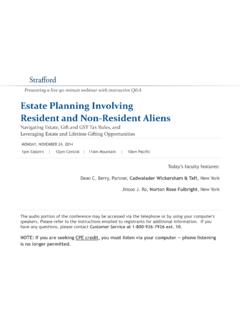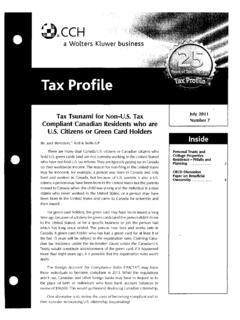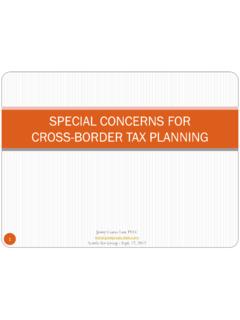Transcription of Tax Global Employer Services US Expatriation rules
1 United Kingdom Tax Global Employer Services Global Employer Services US Expatriation rules April 2011 Are you affected by the US tax rules on Expatriation ? The US imposes income tax on the worldwide income of its citizens and green card holders even if they reside overseas. US citizens and certain green card holders residing overseas are also subject to US gift and estate tax on transfers of worldwide assets. As a result, such individuals sometimes consider relinquishing their citizenship or green card with the hope of freeing themselves from the US tax system. However, giving up US citizenship or a green card on or after 17 June 2008 the date of enactment of the Heroes Earning Assistance and Relief Tax (HEART) Act, 110-245 may cause the expatriating individual to be subject to an exit tax and treated as if all assets were sold on the day before the Expatriation date.
2 Furthermore, US persons receiving gifts from persons expatriating under the HEART Act may be subject to tax. This publication provides a brief overview of the US Expatriation rules under the HEART Act. Please note that the HEART Act repealed the Expatriation rules that were previously enacted under the American Jobs Creation Act of 2004 (AJCA). However, any individual who expatriated prior to the date of enactment of the HEART Act may be subject to the AJCA rules , including the informational reporting requirements of such AJCA rules , which extended for up to a 10-year period from the year of Expatriation .
3 Please consult your tax advisor in order to determine whether any of the HEART Act rules , AJCA rules , or prior Expatriation rules apply in your specific situation. Who is Subject to the US Expatriation rules ? All US citizens who relinquish or give up their citizenship status on or after 17 June 2008, and former long-term residents who give up their green cards after 17 June 2008 are subject to the new Expatriation rules under the HEART Act if they meet any of the following three tests: Net Income Tax Test For the five-year period before Expatriation , the individual had an average annual US income tax liability of at least $147,000 in 2011, (adjusted annually thereafter).
4 Net Worth Test The individual s net worth is at least $2 million. Certification Test The individual fails to certify that he or she satisfied all applicable US tax obligations for the five years before Expatriation . An individual who is subject to the Expatriation rules contained in the HEART Act is referred to as a covered expatriate. What is the Definition of Former Long-Term Resident ? A former long-term resident is an individual who has held a green card for any portion of at least eight of the fifteen tax years preceding Expatriation . Please note that one day is considered a portion of a tax year; therefore, if an individual obtained his or her green card on 31 December 2004, and relinquishes the green card on 1 January 2011, he or she will have held his or her green card for a portion of eight tax years and will therefore be considered a former long-term resident for purposes of these rules .
5 An individual who has been resident in the US for eight years under any other immigration status, such as a work visa, is not a long-term resident for purposes of the Expatriation rules . For example, if an individual was resident in the US for seven years under a work visa and for six more years under a green card , he or she would not be considered a long-term resident. What steps do you need to take to be considered to have Expatriated for purposes of these rules ? Under the HEART Act, the actual act of Expatriation for a US citizen for tax purposes occurs when the individual formally renounces US citizenship.
6 A US citizen shall be treated as relinquishing his or her citizenship on the earliest of the following dates: Date on which he or she renounces nationality before a diplomatic or consular officer of the US Date on which he or she furnishes a signed statement of voluntary relinquishment to the US Department of State. Date on which US Department of State issues to the individual a certificate of loss of nationality. Date on which a US court cancels a naturalized citizen s certificate of nationalization, provided that renunciation or relinquishment under (1) or (2) above is subsequently approved by the issuance to the individual of a certificate of loss of nationality by the US Department of State.
7 A green card holder shall be deemed to have expatriated on the date that lawful permanent resident status ceases. This occurs either on the date a green card is determined to have been revoked or judicially or administratively abandoned, or on the first day of a tax year for which a long-term resident invokes a tax treaty to be treated as a resident of a foreign country and does not waive the benefits offered by the treaty to residents of such foreign country. Appropriate advisors, including immigration counsel, should be consulted before a treaty position is taken, and anytime planning is conducted that affects an individual s residency status for tax purposes.
8 Please note that under prior law, an additional step was required in order for an individual to be considered to have expatriated for tax purposes (the filing of a specific tax form). This additional step is not required under the HEART Act. If you are a covered expatriate, how will you be taxed? Deemed Sale An individual will be deemed to have sold all assets on the day before the date of Expatriation for fair market value. Losses may be taken into account, but only to the extent of gains; therefore, application of the Expatriation rules may not result in a loss for tax purposes. For 2011 the first $636,000 of net gain is excluded for each expatriating individual; this amount is indexed annually.
9 Note that this exclusion is not applicable with respect to certain deferred compensation assets, certain interests in foreign trusts, and specified tax-deferred accounts. A basis adjustment will be applied to all property subject to the deemed sale provisions; such adjustment will ensure that an actual sale at a future date would not result in double taxation due to the prior application of the deemed sale rules . For purposes of determining the basis of property subject to the deemed sale rules , property that was held by an individual on the date the individual first became a resident of the US shall be treated as having a basis equal to the fair market value of such property on the residency start date.
10 An individual may elect not to have this step-up in basis apply. Basis of property acquired after the residency start date would be computed under the standard basis rules . Special rules apply to certain deferred compensation assets, certain interests in foreign trusts, and specified tax-deferred accounts. Tax on Gifts and Bequests A US person who receives a gift or bequest from a covered expatriate is subject to US tax on the receipt of such gift. The total value of the gift is first reduced by the available annual exclusion ($13,000 in 2011), and tax is then assessed at the highest applicable gift tax rate at the time of the gift (in 2011, the top gift tax rate is 35%).









